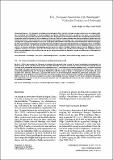Por favor, use este identificador para citar o enlazar a este item:
http://hdl.handle.net/10261/152275COMPARTIR / EXPORTAR:
 SHARE SHARE
 CORE
BASE CORE
BASE
|
|
| Visualizar otros formatos: MARC | Dublin Core | RDF | ORE | MODS | METS | DIDL | DATACITE | |

| Campo DC | Valor | Lengua/Idioma |
|---|---|---|
| dc.contributor.author | Hüglin, Sophie | es_ES |
| dc.contributor.author | Criado-Boado, Felipe | es_ES |
| dc.date.accessioned | 2017-07-04T07:07:36Z | - |
| dc.date.available | 2017-07-04T07:07:36Z | - |
| dc.date.issued | 2017-06-26 | - |
| dc.identifier.citation | Archäologische Informationen 40: 111-120 (2017) | es_ES |
| dc.identifier.issn | 0341-2873 | - |
| dc.identifier.uri | http://hdl.handle.net/10261/152275 | - |
| dc.description | Fokus: Archäologie & Macht. | es_ES |
| dc.description.abstract | [DE] Die European Association of Archaeologists (EAA) hat sich innerhalb von zwei Jahrzehnten zur mitgliederstärksten Vereinigung von Archäologen in Europa entwickelt und hat das Potenzial, noch weiter zu wachsen. Sie wurde u. a. als politische Interessenvertretung gegründet und hat an Konventionen des Europarats und deren Implementierung als Internationale Nichtregierungsorganisation (INGO) mitgearbeitet. Auf den jährlichen Treffen der EAA spielt neben dominierenden wissenschaftlichen Inhalten auch die Debatte um politische Themen besonders in den ständigen Arbeitsgruppen eine wichtige Rolle. Konsequentes professionelles politisches Lobbying beim Europäischen Parlament oder beim Europarat ist aber auf einer momentan noch rein ehrenamtlichen Basis kaum möglich. Die EAA sucht daher die Kooperation mit Vereinigungen auf europäischer, aber auch auf internationaler und nationaler Ebene, die ähnliche Zielsetzungen vertreten. Die EAA wird sich in den kommenden Jahren grundlegend reformieren, um ihren Mitgliedern besser zu dienen und ihrer gestiegenen politischen Verantwortung gerecht werden zu können. Zentraler Gedanke dabei ist es, die Mitglieder selbst zu befähigen, zusammen mit Anderen durch die EAA politisch wirken zu können. Wir sind überzeugt: Archäologie und Archäologen können helfen, die gegenwärtigen Krisen zu lösen, weil sie aus der Langzeitperspektive der Sachkultur heraus neue Einsichten zu Kernfragen der Menschheit liefern. | es_ES |
| dc.description.abstract | [EN] Within two decades, the European Association of Archaeologists has become the largest organisation of archaeologists in Europe and has still the potential to grow. Among other aims, EAA was founded to formulate and implement conventions with the Council of Europe as an International Non-Governmental Organisation (INGO). Especially in the permanent Working Groups, the debate of political topics always has played an important role at EAAs Annual Meetings next to the exchange of information and scientific results. Consistent professional political lobbying with the European Parliament or with the Council of Europe is not possible on a momentarily still purely voluntary basis. Therefore, EAA seeks to cooperate with partners on an international and national level, which have similar aims. In the coming years, EAA is going to reform itself in order to serve its increased membership better and to embrace the grown political responsibility. Central to this is the idea to empower the members to act politically themselves through the EAA. We are convinced: archaeology and archaeologists can help to solve the current crisis, because from their material long-term perspective they contribute new insights to key questions of humanity. | es_ES |
| dc.language.iso | deu | es_ES |
| dc.publisher | Deutsche Gesellschaft für Ur- und Frühgeschichte | es_ES |
| dc.relation.isversionof | Publisher's version | es_ES |
| dc.rights | openAccess | es_ES |
| dc.subject | Archäologie | es_ES |
| dc.subject | EAA | es_ES |
| dc.subject | INGO | es_ES |
| dc.subject | Institutionengeschichte | es_ES |
| dc.subject | Lobbyarbeit | es_ES |
| dc.subject | Interessenvertretung | es_ES |
| dc.subject | Europa | es_ES |
| dc.subject | EU-Skepsis | es_ES |
| dc.subject | Archaeology | es_ES |
| dc.subject | Cultural Heritage | es_ES |
| dc.subject | Interest group | es_ES |
| dc.subject | Europe | es_ES |
| dc.subject | EU scepticism | es_ES |
| dc.subject | European/EU politics | - |
| dc.subject | European Archaeology | - |
| dc.title | Die "European Association of Archaeologists": Politische Position und Potenzial | es_ES |
| dc.title.alternative | The European Association of Archaeologists: political position and potential | es_ES |
| dc.type | artículo | es_ES |
| dc.identifier.doi | 10.11588/ai.2017.1.42470 | - |
| dc.description.peerreviewed | Peer reviewed | es_ES |
| dc.relation.publisherversion | http://doi.org/10.11588/ai.2017.1.42470 | - |
| dc.identifier.e-issn | 2197-7429 | - |
| dc.rights.license | http://creativecommons.org/licenses/by/4.0/ | - |
| dc.relation.csic | Sí | es_ES |
| oprm.item.hasRevision | no ko 0 false | * |
| dc.type.coar | http://purl.org/coar/resource_type/c_6501 | es_ES |
| item.grantfulltext | open | - |
| item.cerifentitytype | Publications | - |
| item.openairecristype | http://purl.org/coar/resource_type/c_18cf | - |
| item.languageiso639-1 | deu | - |
| item.fulltext | With Fulltext | - |
| item.openairetype | artículo | - |
| Aparece en las colecciones: | (INCIPIT) Presidencia de la European Association of Archaeologists (EAA) | |
Ficheros en este ítem:
| Fichero | Descripción | Tamaño | Formato | |
|---|---|---|---|---|
| ArchInf_40_Huglin_Criado-Boado.pdf | 2,14 MB | Adobe PDF |  Visualizar/Abrir |
CORE Recommender
Page view(s)
223
checked on 16-abr-2024
Download(s)
101
checked on 16-abr-2024
Google ScholarTM
Check
Altmetric
Altmetric
Este item está licenciado bajo una Licencia Creative Commons

